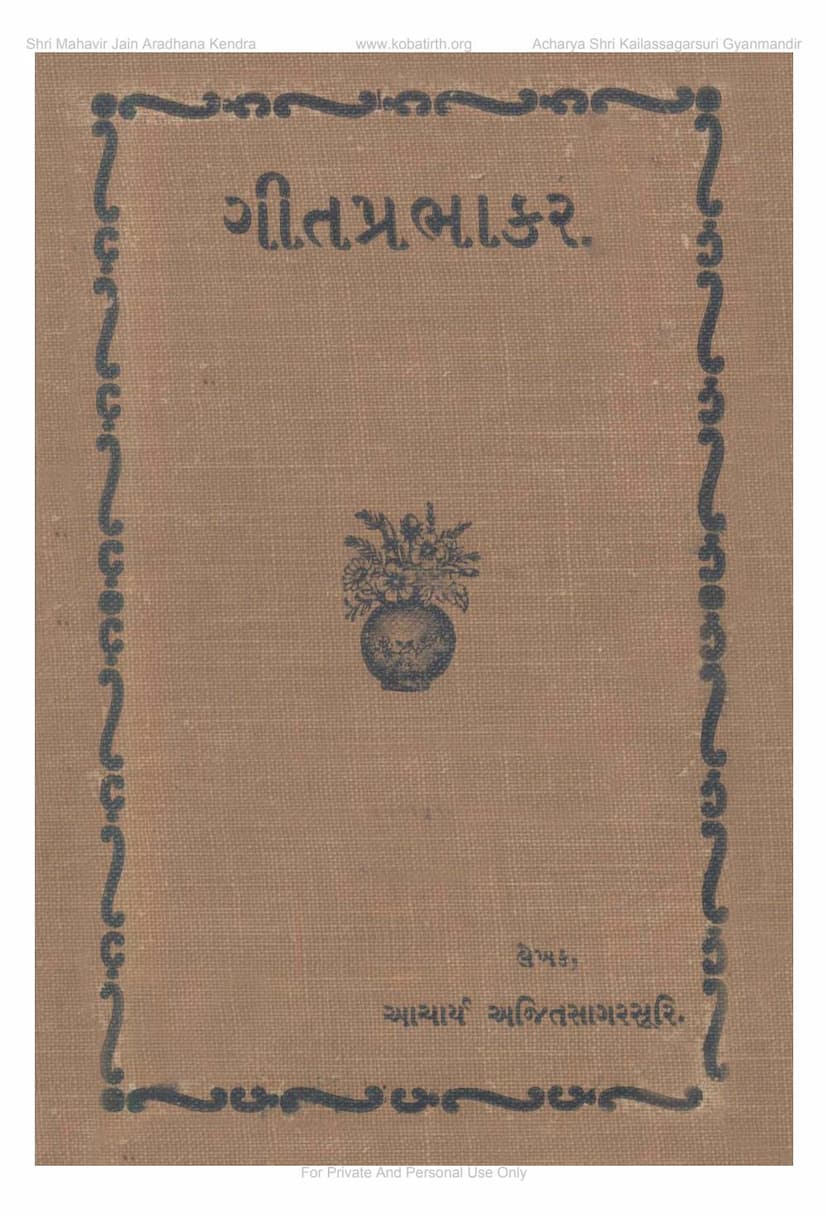Geet Prabhakar
Added to library: September 1, 2025

Summary
Here's a comprehensive summary of the Jain text "Geet Prabhakar" based on the provided pages:
Book Title: Geet Prabhakar Author: Ajitsagarsuri Publisher: Ajitsagarsuri Shastra Sangraha
Overview:
"Geet Prabhakar" is a collection of devotional and philosophical poems written in Gujarati by Acharya Ajitsagarsuri. The text delves into various aspects of Jain philosophy, ethics, social reform, and spiritual devotion. It emphasizes the importance of inner purity, detachment from worldly pleasures, devotion to the divine, and righteous conduct. The poems often employ metaphors and imagery from nature and everyday life to convey spiritual truths and moral lessons.
Key Themes and Content:
-
Devotion (Bhakti): A significant portion of the poems express deep devotion to God (Prabhuji), often personified as Krishna or other divine figures, drawing parallels with the devotional traditions of other Indian saints and poets. The poems explore themes of longing for the divine, spiritual union, and the ecstasy of devotion. The concept of "Premalakshana Bhakti" (devotion characterized by love) is evident.
-
Spiritual Wisdom (Adhyatma): The text extensively discusses spiritual concepts such as:
- The nature of the soul: The soul is described as the true self, distinct from the body and worldly attachments.
- Detachment (Vairagya): The impermanence of worldly pleasures and the importance of detachment are highlighted.
- Spiritual Union (Advaita): The poems explore the concept of oneness with the divine, where the individual soul merges with the supreme soul.
- The power of divine names: Chanting the names of God is presented as a means to overcome suffering and attain liberation.
- Meditation and contemplation: The text encourages deep introspection and meditation to realize the divine within.
-
Ethical and Moral Teachings: Acharya Ajitsagarsuri uses his poetry to address social issues and impart moral guidance:
- Non-violence (Ahimsa): The principle of non-violence is implicitly and explicitly promoted, condemning cruelty towards living beings.
- Social Evils: The poems criticize practices like child marriage, the sale of daughters, the mourning rituals (especially for widows), the consumption of alcohol and tobacco, and hypocrisy among spiritual leaders.
- Righteous Conduct: Emphasis is placed on truthfulness, purity of thought and action, kindness, and compassion towards all beings.
- Importance of Knowledge and Education: The text advocates for spiritual and worldly knowledge as essential for personal and societal progress.
-
The Nature of Reality and Illusion: The poems distinguish between the transient nature of the material world (Maya) and the eternal reality of the divine and the soul. The world's pleasures are often depicted as fleeting and ultimately unsatisfying.
-
The Role of the Guru: The importance of a spiritual guide (Guru) in the path to enlightenment is recognized. Gurus are seen as illuminating the path and providing the necessary wisdom.
-
The Significance of Rasa (Aesthetic Emotion): The text, particularly in the introductory and critical sections, discusses the concept of "Rasa" (aesthetic emotion) as the soul of poetry, highlighting the poet's ability to evoke these emotions in the reader. The presence of "Shringar Rasa" (erotic or beautiful sentiment) is discussed in the context of spiritual devotion, emphasizing its purity when directed towards the divine.
-
Literary Style: Acharya Ajitsagarsuri's poetry is characterized by:
- Melodious Language: The poems are described as having musicality, lyrical beauty, and pleasing rhythm, making them suitable for singing.
- Simplicity and Clarity: The language is generally accessible, conveying profound ideas with clarity.
- Vivid Imagery: The poems often use evocative imagery from nature and spiritual experiences to create a strong emotional impact.
- Variety of Forms: The collection includes various poetic forms like devotional songs (bhajans), ghazals, and other lyrical compositions.
Specific Mentions and Insights:
- Dedication: The book is dedicated to the "immortal soul" of Seth Jamnadas Gokuldas Dosa, a devotee of God.
- Contributors: The text acknowledges contributions from individuals like Shri Gokuldas Nanjibhai Gandhi for the introduction and Shri Nagkumar B.A. for the "Kavya Parichay."
- Influence of Guru Buddhisagar Surishwarji: Ajitsagarsuri's literary journey is presented as a continuation of his guru's work, highlighting a strong spiritual lineage.
- Social Commentary: The poems are noted for their sharp critique of societal ills and their aspiration for social reform.
- Modern Relevance: The poems are seen as reflecting the times, with references to contemporary issues like the independence movement ("Satyagrahi Darta Nathi") and modernization ("Sansar pan chhe Railway," "Vijdli aakashthi").
- Purity of Gujarati Language: A specific point is made about Ajitsagarsuri's contribution to enriching Gujarati literature with pure Gujarati language, free from undue influence of other languages.
- Universal Appeal: The poems are described as transcending sectarian boundaries, appealing to both Jain and non-Jain readers.
In essence, "Geet Prabhakar" is a significant work in Jain literature, offering a blend of spiritual guidance, ethical teachings, and artistic expression, all aimed at guiding the reader towards a more virtuous and spiritually fulfilling life.